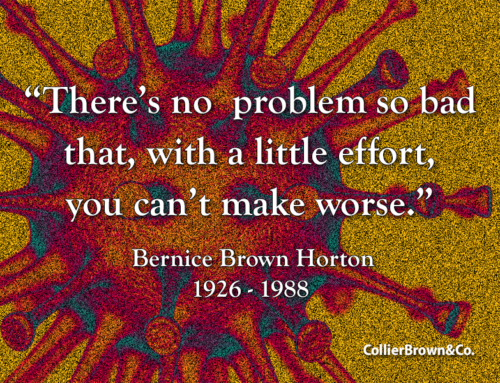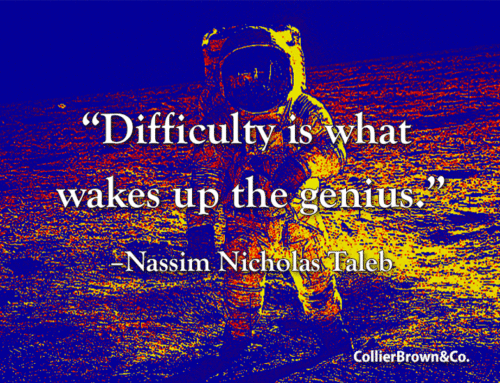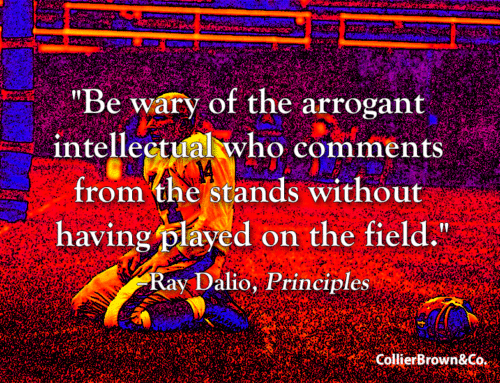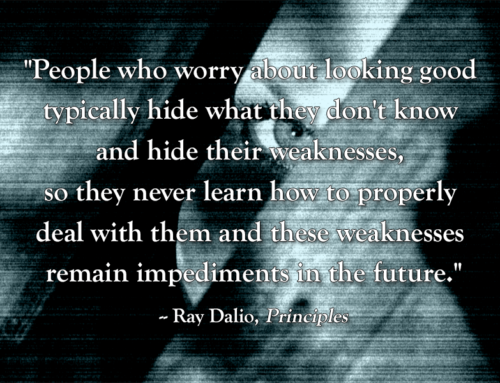My client began the conversation with, “I hate politics!” As a senior vice president in a large closely held firm she had seen plenty of office politics and she didn’t like what she had seen – and experienced.
In my previous post I introduced some thinking about politicians as leaders. The other side of the conversation involves the wisdom, necessity and practical use of politics by “those who lead.” As my client expressed, “being political” has rightly earned its negative connotation. Intent is important. People dislike manipulation. However, “influencing with integrity” is a legitimate effort to persuade and change perceptions.
If you ignore organizational politics you are putting yourself and your agenda at risk. To some, corporate politics, and its attendant power and influence, is a blood sport. You may find it necessary to protect the change you seek. Technical change and competency (the x’s and o’s) alone are insufficient; getting things done usually is a political challenge.
At the core, politics is about knowing and understanding flow of information and influence in the organization to determine “how things happen around here.” Remember, as one who leads, you have made the choice to bring about change and change requires energy (power or influence) and knowledge in order to happen.
Know Thyself
It’s important to remember that you have a role in whatever happens here, no matter how large or how small. So the first question is “What do you really want?” and my follow up question is “Are you behaving as though that’s what you really want?”
Here are some other questions to keep you thinking: Are you clear on your values, really clear? What are they? How far are you willing to go to get what you what? What boundaries will you not cross? How clear are your goals and objectives? How effective is your ability to empathize with others, to see what they see and feel how they feel it? How’s your ability to anticipate their responses to events? What is your tolerance and willingness to listen, really listen? How’s your ability and willingness to learn? Assess the level of your knowhow to draw on previous experiences to guide future efforts. Are you comfortable in your own skin?
Know the Net(work)
First, know your social network inside the organization: the relevant ties you have to other people who have a vested interest in you and your agenda. What are their personalities and behavior patterns? What skill sets do they have and how well do they execute those skills? What are their track records in demonstrating good judgment? Are they truth tellers (especially to you)? How will they respond, adapt and execute when change happens?
Secondly, you might find it helpful to consider the thinking and issues of those outside the organization, other key stakeholders such as suppliers, customers or even communities of interest or affinity that might care about or influence your thinking or agenda.
Context Matters
In thinking about “what’s going on” and “how things happen here” you might want to consider what various groups are thinking and doing. Think about specific groups, their common interests, their issues, whether they support/oppose your agenda, about any possible shared interests (things you both care about), or potential opportunistic trades (you support me, I’ll support you). You can divide your thinking into various types of groups: organizational groups (employees bound by similar training, expertise, shared tasks, supervision), affinity groups (employees linked by a common interest, identity, ideology or purpose.), power coalitions (banded together opportunistically to advance shared interests; they likely share no other interests).
More questions: Who has the authority to approve what I’m proposing? Who has the authority to stop it? Who has the authority to slow it down or divert resources that I may need to elsewhere in the business? Why would they help me? Hinder me? What can I/should I do about it either way?
You need some help. It’s important to build coalitions that support your initiatives and positions and to prevent the formation or neutralize the effectiveness of collations that do not.
If you’re one of those people who loves corporate politics as a blood sport, this post is not for you. It’s written for the person who “hates politics” but needs to realize that political awareness and understanding “how things happen here” is a vital part of being one who leads.
In The Word…
I am sending you out like sheep among wolves. Therefore be as shrewd as snakes and as innocent as doves. Matthew 10:16
In Other Words…
“Between the idea and the reality, between the motion and the act, falls the shadow.” – T.S. Eliot
“For me, the lame part of the Sixties was the political part, the social part. The real part was the spiritual part.” – Jerry Garcia
“With foxes, we must play the fox.” – Thomas Fuller
“Invisible threads are the strongest ties.” – Friedrich Nietzche
“An organization’s results are determined through webs of human commitments, born in webs of human conversations.” – Fernando Flores
“Collaborative conversations are the principal driver for learning in today’s organizations.” – Palo Alto Research Center
“The devil hath power to assume a pleasing shape.” – William Shakespeare
“Daniel-san, never put passion before principle. Even if win, you lose.” – Mr. Miyagi, The Karate Kid
“In war, you can only be killed once, but in politics, many times. “ Winston Churchill









Leave A Comment